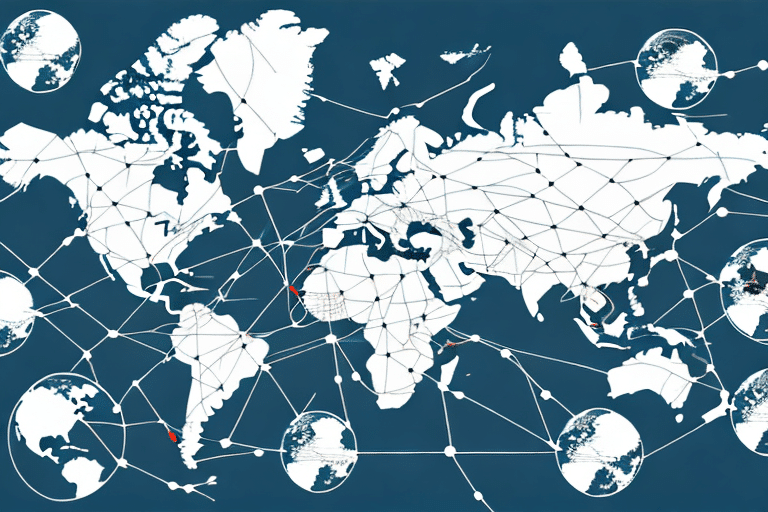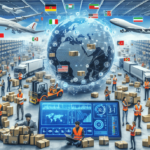Unlocking the Benefits of International Logistics
International logistics is a complex process that involves moving goods across different countries and regions. It is an integral part of many businesses, especially those that operate on a global scale. The benefits of international logistics include increased efficiency, lower costs, and greater access to new markets. In this article, we will delve into the essentials of international logistics, its significance for business expansion, and strategies to optimize your logistics operations. Additionally, we will explore the challenges faced in international logistics and how to navigate them, the pivotal role of technology, best practices for customs and compliance, and the importance of collaboration for successful outcomes.
Understanding International Logistics
The Fundamentals of International Logistics
International logistics encompasses the coordination and management of goods as they move across national borders. This includes transportation, storage, and distribution of products. Effective international logistics ensures that goods are delivered on time and in optimal condition, adhering to varying regulatory requirements such as customs regulations and trade agreements.
Transportation Modes and Their Implications
Managing different transportation modes is one of the primary challenges in international logistics. Goods may be transported by air, sea, or land, each with its own set of requirements and regulations. For instance, air freight is faster but more costly, whereas sea freight is more economical for larger shipments but takes longer.
Inventory and Warehousing Management
Effective inventory management and warehousing are crucial components of international logistics. Determining optimal locations for warehouses and distribution centers can significantly reduce transportation costs and delivery times. According to a Statista report, optimized inventory management can enhance efficiency by up to 25% in logistics operations.
Strategizing for International Logistics Success
Developing a Robust Logistics Strategy
Creating an effective international logistics strategy involves several key steps:
- Define Business Goals: Understand your objectives for entering international markets.
- Market Research: Analyze logistics requirements and regulatory landscapes of target markets.
- Choose Transportation Methods: Select the most suitable transportation modes based on cost, speed, and reliability.
- Partner Selection: Collaborate with reliable logistics partners to ensure seamless operations.
- Continuous Optimization: Regularly assess and refine your logistics strategy to adapt to changing market conditions.
Incorporating Sustainability
Environmental considerations are increasingly vital in logistics. Businesses can reduce their carbon footprint by opting for eco-friendly transportation methods, such as using electric vehicles or selecting greener shipping options. Implementing sustainable practices not only benefits the environment but can also enhance brand reputation and attract environmentally conscious consumers.
Overcoming Challenges in International Logistics
Customs and Compliance
Compliance with international customs regulations and trade agreements is essential for smooth logistics operations. Partnering with experts who specialize in customs clearance can mitigate risks of delays and penalties. Maintaining accurate documentation and staying informed about regulatory changes are critical for ensuring compliance.
Managing Inventory Across Borders
Balancing inventory levels to meet demand without incurring excessive storage costs is a significant challenge. Utilizing advanced Warehouse Management Systems (WMS) can aid in real-time inventory tracking and management, ensuring optimal stock levels across different regions.
Mitigating Risks from Global Events
Global events such as natural disasters or geopolitical tensions can disrupt supply chains. Developing contingency plans and diversifying suppliers can help businesses remain resilient in the face of such disruptions. For example, the COVID-19 pandemic underscored the importance of agility and adaptability in logistics strategies.
The Role of Technology in Enhancing Logistics Efficiency
Leveraging Advanced Technologies
Technological advancements like blockchain and the Internet of Things (IoT) are revolutionizing international logistics by improving supply chain visibility and reducing errors. Transportation Management Systems (TMS) and Warehouse Management Systems (WMS) automate processes, enhancing accuracy and speed.
Supply Chain Visibility and Data Analytics
Implementing real-time tracking systems and data analytics tools can provide comprehensive visibility into the supply chain. This enables businesses to identify bottlenecks, predict potential disruptions, and make informed decisions to enhance efficiency and reliability.
Sustainability in International Logistics
Balancing Profitability with Environmental Responsibility
Sustainable logistics practices are becoming pivotal as businesses strive to balance profitability with environmental stewardship. Reducing emissions through optimized transportation routes and minimizing waste in packaging are effective strategies. According to a United Nations report, sustainable logistics can lead to significant cost savings and improved corporate image.
Implementing Green Logistics Practices
Adopting green logistics involves using energy-efficient transportation modes, recycling materials, and implementing waste reduction measures. Collaborating with logistics partners who prioritize sustainability can further amplify these benefits.
Future Trends in International Logistics
Automation and Robotics
The adoption of automation and robotics is set to transform international logistics by increasing efficiency and reducing human error. Automated warehouses and robotic picking systems enhance speed and accuracy in order fulfillment.
The Growth of E-commerce and Cross-Border Trade
The surge in e-commerce has accelerated cross-border trade, necessitating more sophisticated logistics solutions. Businesses must adapt to the increasing demand for faster delivery times and enhanced customer experiences.
Post-Pandemic Preparedness
The COVID-19 pandemic highlighted the need for resilient logistics strategies. Moving forward, businesses are investing in digital technologies and flexible logistics networks to better withstand future disruptions.
Conclusion
International logistics is a cornerstone of global business growth, enabling companies to access new markets and boost revenues. Success in international logistics demands meticulous planning, strategic coordination, and robust collaboration with partners across the supply chain. By embracing advanced technologies, implementing sustainable practices, and continuously optimizing logistics strategies, businesses can harness the full potential of international trade, achieving enhanced efficiency, profitability, and sustainability.




















